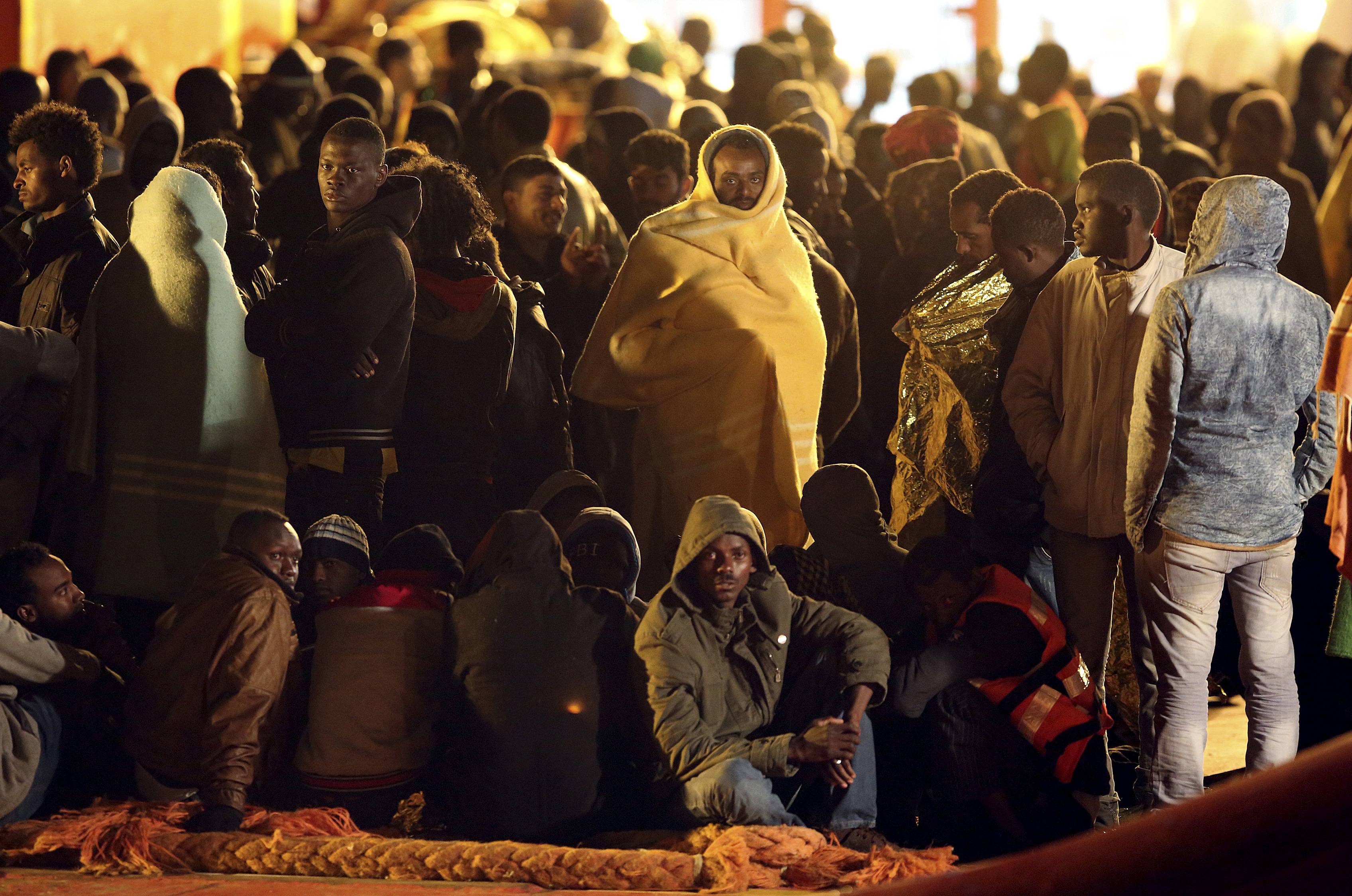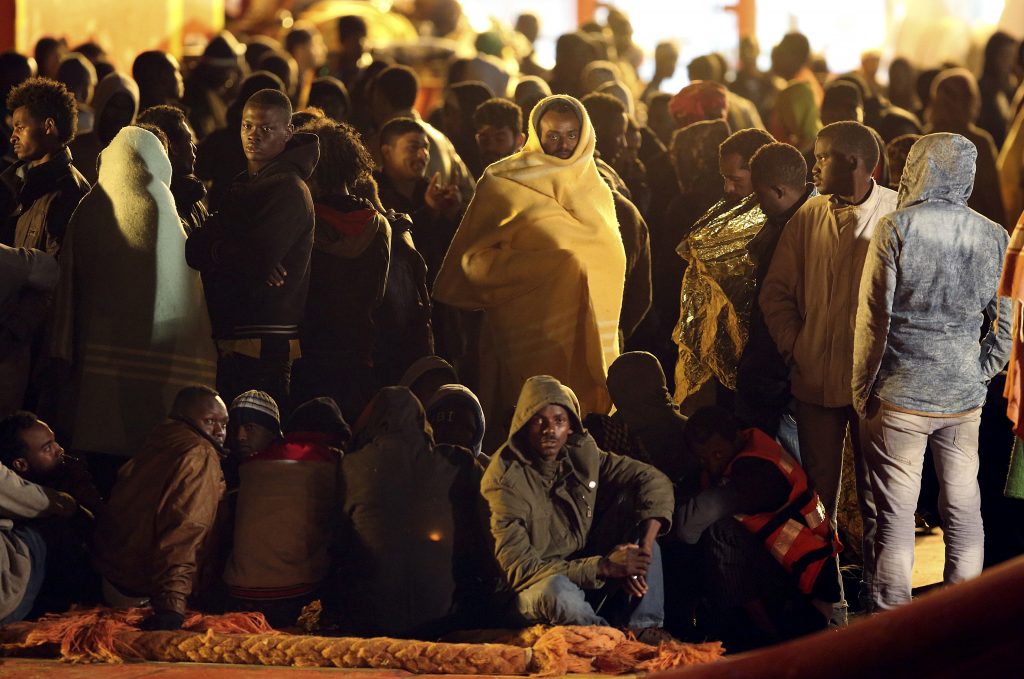
EU plan to bomb traffickers’ ships in Libyan waters ‘counterproductive,’ says Atlantic Council’s Mezran
The European Union wants the United Nations to support its plan to destroy human traffickers’ ships in Libyan territorial waters before smugglers use them to ferry migrants across the Mediterranean Sea. Can it work?
No, said Karim Mezran, Resident Senior Fellow at the Atlantic Council’s Rafik Hariri Center for the Middle East. He argued that it’s “counterproductive” to publicize such operations.
“To say out loud that foreign military forces will target the smugglers’ ships is just giving them a sign. The smugglers will hide their boats,” said Mezran, suggesting instead that the vessels should be destroyed secretly.
On May 11, EU Foreign Policy Chief Federica Mogherini urged the UN Security Council to authorize military action to bomb smugglers’ empty boats in Libyan waters. Mogherini said the migrant problem requires an “exceptional” response.
Under the proposed plan, EU vessels will patrol Libyan territorial waters and helicopter gunships will “neutralize” the traffickers’ ships.
The EU proposal is a reflection of the alarm in Europe over the deluge of African and Arab migrants—a flow that has shown little sign of abating. Mogherini called the situation “unprecedented.”
While no one knows exactly how many migrants have fled their home countries, by some accounts EU member states have received close to 700,000 asylum applications during the twelve-month period ending March 2015.
Not everyone is lucky enough to survive the journey.
More than 1,700 migrants have drowned so far this year while attempting to escape war and poverty on overcrowded ships. A significant portion of that toll—around nine hundred migrants—drowned April 19 when their ship capsized off the Libyan coast.
European leaders have committed to sending naval ships to rescue migrants at sea. They have also promised to double the size of the EU “Triton” mission that replaced a larger Italian naval search-and-rescue operation—Mare Nostrum—in November.

A migrant waits to disembark a tug boat in the Sicilian harbour of Pozzallo, southern Italy, May 4. (Reuters/Antonio Parrinello)
Libyan Opposition to Plan
Trafficking of people and goods has flourished largely due to the chaos in Libya, which today has two governments, only one of which—the one in Tobruk—enjoys international recognition. Libya. is overrun by lawless militias and has long, porous borders. The Islamic State of Iraq and al-Sham (ISIS) has also exploited the situation and put down roots in Libya.
Libya’s response to the trafficking crisis has been absent at best.
“The Libyan authorities in Tobruk don’t have the capacity to propose anything because they don’t control the territory. And the so-called authorities in Tripoli might do something, but they want international recognition in exchange,” said Mezran.
While in hardly any position to deal with the problem themselves, Libyan officials have criticized the EU plan.
Libya’s Ambassador to the United Nations, Ibrahim Dabbashi, told the BBC that the Tobruk government he represents opposes the idea.
“The Libyan government has not been consulted by the European Union. They have left us in the dark about what their intentions are, what kind of military actions they are going to take in our territorial waters, so that is very worrying,” Dabbashi told BBC.
“We want to know… how they can distinguish between the fishers’ boats and the traffickers’ boats,” he added.
Amnesty International, too, has criticized the EU plan, saying it would leave migrants stranded in a conflict zone. In Libya, says the human rights group, migrants face horrific conditions at the hands of traffickers and organized criminal groups, including sexual violence, torture, and abductions for ransom.
“From the point of view of the Europeans, they see bombing the ships as a way to diminish the flow of migrants for awhile. But, of course, unless a solution is found to control the borders in Libya, this problem will not be solved,” said Mezran. “Migrants will be trapped in prison camps where they will face human rights violations.”
EU’s Migrant Quota Plan
The EU is also mulling the introduction of a controversial quota system for distributing migrants who make it across the Mediterranean Sea among EU countries.
The European Commission is expected to propose the plan May 13.
Traffickers’ ships from Libya typically head for closest European landmass—the Italian island of Lampedusa.
In an April 22 column for the New York Times, Italian Prime Minister Matteo Renzi acknowledged that “Italy’s geopolitical role and location make our country a leading player in this struggle” with the migrant issue.
Noting that Italy is not the final destination for most migrants, Renzi urged fellow EU member states to share the burden with his country. Mezran said the debate in Europe is over whether the migrants are an Italian problem or a European one.
“This is a European problem. It is not an Italian problem,” he said. “Each country should have a quota system.”
Mezran spoke in an interview with the New Atlanticist’s Ashish Kumar Sen. Here are some excerpts:
Q: What are your thoughts on the EU proposal to destroy smugglers’ ships in Libyan territorial waters? Can this work?
Mezran: It doesn’t make much sense to publicize what should have been a covert military operation. To say out loud that foreign military forces will target the smugglers’ ships is just giving them a sign. The smugglers will just hide their boats. So publicizing such an operation beforehand is counterproductive.
This should have been done like all secret operations. You have intelligence on the ground and then send Navy SEALs in to destroy the boats.
Q: Wouldn’t Libya view a covert operation as an attack on its sovereignty?
Mezran: At this point it does not matter, because the Libyan authorities cannot take care of this problem. It is perfectly alright for the international community to undertake every effort to stop this flow of migrants. Something has to be done to break the criminal activity.
Q: Libyan officials oppose the EU plan and Amnesty International says migrants will be trapped in a conflict zone.
Mezran: It is indeed a much larger problem.
From the point of view of the Europeans, they see bombing the ships as a way to diminish the flow of migrants for awhile. But, of course, unless a solution is found to control the borders in Libya this problem will not be solved. Migrants will be trapped in prison camps where they will face human rights violations.
This is a huge problem that needs the involvement of the international community. It needs to be tackled in these migrants’ homelands. It has to be tackled in Libya. Stopping the migrants on the coast should be the last resort.
Q: Is there a danger that an attack by the smugglers on EU vessels and aircraft could suck NATO into the conflict?
Mezran: Smugglers might hit these vessels, but it is a remote possibility. If that happens, it might suck NATO into the conflict.
What I am afraid of is that there is no political framework for engagement. If the EU acts without the support of the government in Tobruk or the Libya Dawn [militia] in Tripoli, it will not produce anything. Military intervention from the West would only make sense if it were done within an international framework, and with the support of a national unity government in Libya.
Q: What are Libyan authorities doing to address this problem of human traffickers?
Mezran: The Libyan authorities in Tobruk don’t have the capacity to propose anything because they don’t control the territory. And the so-called authorities in Tripoli might do something, but they want international recognition in exchange.
Q: The European Commission will present a quota system for taking in migrants. What are your thoughts on this proposal?
Mezran: This is a European problem. It is not an Italian problem. Europe has to help Italy and Greece and the frontier countries. Each country should have a quota system. The migrants have made it clear that they want to go up north and not stay on in Italy.
Q: Italian Prime Minister Renzi has complained that other EU countries aren’t doing enough. What more should they do?
Mezran: They should devote more resources to support Italy to take in these migrants. Once they reach the European coast, they should be absorbed through the quote system. Two hundred thousand people are a lot for Italy, but for all of Europe, that is a tiny number.
Ashish Kumar Sen is a staff writer at the Atlantic Council.
Image: Migrants rest after disembarking from a tug boat in the Sicilian harbor of Pozzallo, southern Italy, May 4. Nearly 5,800 migrants were plucked from boats off the coast of Libya and ten bodies were recovered in less than 48 hours, Italy's coast guard said, in one of the biggest rescue operations this year. (Reuters/Antonio Parrinello)
